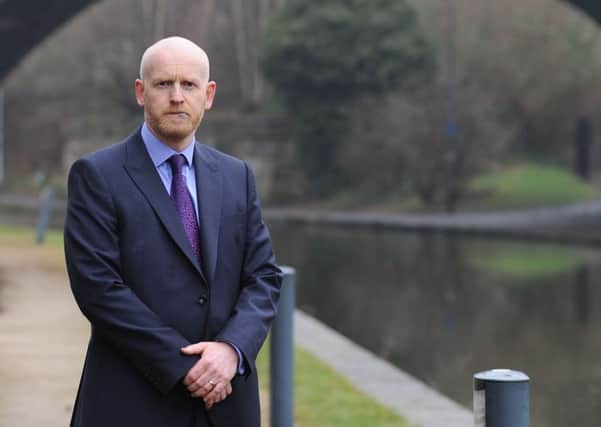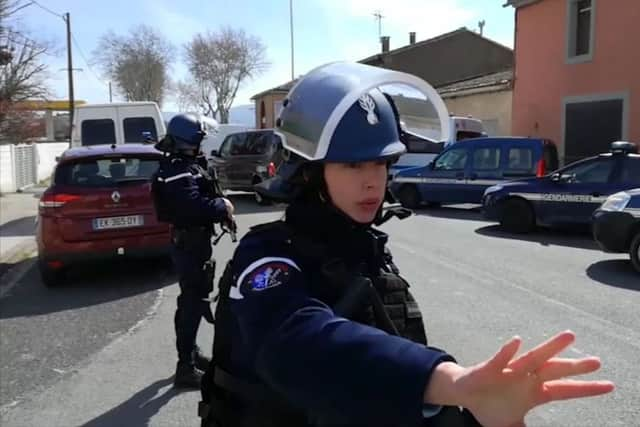Yorkshire's counter-terror chief warns '˜unprecedented' threat of deadly attacks continues


Speaking exclusively to The Yorkshire Post, Detective Chief Superintendent Martin Snowden said the “scale and pace” of terrorism had changed, with more lone attackers armed with low-tech weapons such as knives and vehicles.
Armed police yesterday killed a gunman who shot dead three people in the French town of Trebes, pledging allegiance to the so-called Islamic State (IS) group.
Advertisement
Hide AdAdvertisement
Hide AdMeanwhile, Parsons Green Tube bomber Ahmed Hassan, whose device injured 51 when it partially exploded on a carriage in September, was jailed for life.


Det Chf Supt Snowden said in a 12-month period that has seen five attacks on UK soil, his unit’s workload had been about a third higher than normal and he was “fully expecting” it to stay at this heightened level for some time.
He said: “It is that change in scale and change in pace that has probably made our world harder over the past 12 months.”
This increase in counter-terrorist activity was “across the board”, from the number of people referred to the Government’s anti-radicalisation Prevent programme to the number of people arrested for terror offences, he said.


Advertisement
Hide AdAdvertisement
Hide AdAcross the country, a total of 600 investigations are running into 3,000 individuals, with a further 20,000 people flagged as being of concern.
Det Chf Supt Snowden said: “Traditionally, we would probably be investigating complex conspiracy-style plots that were possibly slightly slower in nature and involving groups of certain sizes.
“We are still doing that but we are now also seeing more separate plots with lone individuals and less sophisticated methodology, as we have seen in some of the attacks in 2017 that were using vehicles and knives in their attacks.”
But he insisted his West Yorkshire-based unit had the resources it needed to match the threat, saying mainstream police forces and other counter-terror units across the country offered “additional support” when it was needed.
Advertisement
Hide AdAdvertisement
Hide AdBy the same token, he said, his officers had helped in the investigations into the attacks on Manchester Arena, Westminster Bridge and London’s Borough Market, which claimed a total of 35 innocent lives.
Det Chf Supt Snowden said armed police officers would continue to be a common sight at shopping centres, sporting and music events and airports as they “work as hard as we can to keep the public safe”.
“The past 12 months, since the first attack in March last year, has been an extraordinary, unprecedented year with challenging demands for counter-terrorism policing,” he said.
“We saw five terror attacks, 36 people died and hundreds more were injured so we know there are, quite understandably, increasing concerns.”
Advertisement
Hide AdAdvertisement
Hide AdDr Afshin Shahi, a senior lecturer in Middle=East politics at the University of Bradford’s peace studies department, said the heightened terror threat in the UK had to be seen in a wider global context.
He said: “Things happening in countries like Iraq, Yemen and Syria have an effect in places as far away as Yorkshire, so you always have to bear the transnational nature of terrorism in mind.”
Dr Shahi said IS “and its propaganda machine” had long been encouraging its followers around the world to spread terror using low-tech weaponry such as knives or cars.
But he said the threat posed by IS had now “changed beyond recognition” since its territories in Iraq and Syria collapsed.
Advertisement
Hide AdAdvertisement
Hide AdThe organisation had amassed vast wealth which was now being invested in global markets, he said, while supporters who had travelled from around the world to fight with IS had dissipated.
He said: “Now, all of a sudden, thousands and thousands and thousands of foreign fighters who had been concentrated in specific areas in the Middle East have gone back to their home countries once more.”
